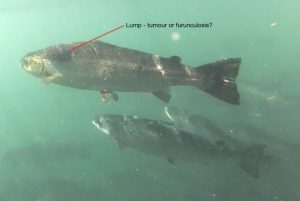Furunculosis
Furunculosis is a serious bacterial disease found predominantly in salmonids. Fish infected with the disease develop boils and blisters on their skin.
In 1991, IBEC brought Atlantic salmon eggs into Canada from the Landcatch hatchery in Scotland. Landcatch was known for having shipped stock infected with furunculosis to Norway – triggering an outbreak that spread to 70 Norwegian rivers
- When IBEC introduced farm salmon to Musgamaqw Dzawada’enuwx territory, a furunculosis epidemic broke out in farms shortly after. It then spread to Coho salmon that migrated past the farms and entered a local enhancement hatchery.
- DFO and the Province of BC refused to release information on the strain of the bacteria, preventing discovery of its origin and comparison to the Norwegian strain.
- IBEC was permitted to leave the infected salmon in the water and treat them with large doses of the antibiotic Oxytetracycline.
Chinook spring run vanishes
A second furunculosis outbreak occurred in 1994, originating in the Scanmar farms. This strain was resistant to all three antibiotics approved for salmon farming and spread quickly to the nearby B.C. Packer’s salmon farms (Needham 1995).
- Immediately all age-classes of wild Chinook salmon in the Kingcome Inlet area crashed. The fishing lodges in Kingcome Inlet shut down. And the legendary spring run of Chinook salmon vanished with no visible effort by the federal government to find out why.
- At Raincoast’s urging, Fisheries and Oceans (DFO) tested and found furunculosis in local wild pink salmon in the Kakweikan River. DFO would not, however, report on the antibiotic resistance profile or whether it was the same strain as in the farms.
- Again, DFO allowed farmers to leave the infected fish in the water – releasing the drug Erythromycin previously banned for use in food fish (DFO Streamtips 1992).
Today the Furunculosis virus remains an issue in farm salmon but the impact on wild salmon has not been studied. What we do know is that it is highly contagious and known to kill Pacific salmon.

